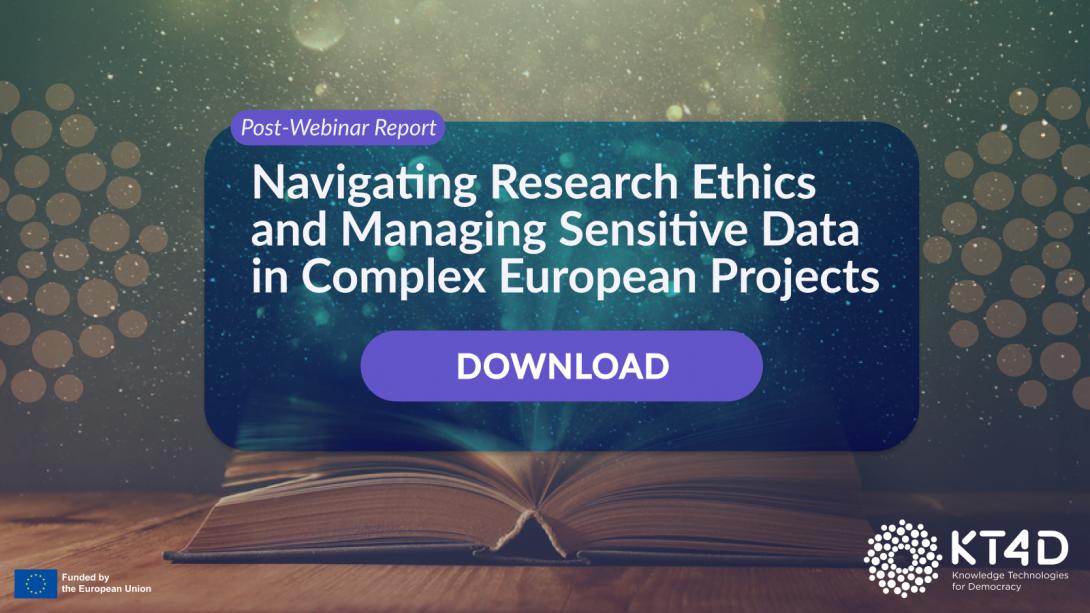Key Takeaways from February KT4D Webinar: Navigating Research Ethics and Managing Sensitive Data in Complex European Projects
16, April, 2024

On February 29, KT4D hosted a webinar to discuss the importance of ethical research best practices. While advancements in the digital era have created an easier pathway for researchers to discover, collect, and store information, this proliferation of data access has complicated compliance enforcement processes and regulations. Although researchers and institutions have an ethical and legal obligation to protect and securely manage data, especially human subject data, a knowledge gap exists on compliance protocols and the best practices for implementing them.
This webinar, ‘Navigating Research Ethics and Managing Sensitive Data in Complex European Projects’, supports research organisations, academic institutions, policymakers, technology providers, computer sciences, civil society organisations, with data protection strategies to help combat preventable misconduct.
The webinar was moderated by Jennifer Edmond, an Associate Professor of Digital Humanities and Culture at Trinity College Dublin, as well as the KT4D Project Coordinator. Her introduction examined the multi-faceted list of challenges preventing compliant ethical research. She expanded on how multi-partner, cross-country, and detailed socio-cultural projects have created a convoluted landscape, making it hard for institutional guidelines to be applied holistically. Additionally, tight timelines for project deliverables pressure researchers to overlook compliance measures. Codes of conduct can be country specific, with different legal systems preventing parallel work between partners. Most importantly, a clear governance structure, or reference model, does not exist to inform SMEs, CSOs, and other organisations where and how to find oversight partners.
To overcome this list of hurdles, Edmond highlighted how researchers need to accommodate for reviews in their planning timelines and can always seek out assistance from the EUREC for any compliance advice or concerns.
Kate Francis, Privacy and Ethics Researcher at ICTLegal Consulting, and Alberto Bettiol, Partner ICTLegal Consulting, continued the discussion on consent and oversight protocols, examining the GDPR interpretations of data and processing, and how data protection by design, although it may seem like a burden, fosters innovation.
The presentation started by emphasising how ethical, cybersecurity, and data protection violations can be avoided by simply working together with a legal partner to integrate security measures into the fabric of project designs, so they are compliant by default from the start. Researchers need to understand that the law does not interfere with the research process. Lawyers exist to protect research subjects from being harmed and support researchers by providing them with knowledge to improve the efficacy of their processes.
When referring to ethical standards, there are two elements that need to be top of mind for researchers; informed consent and independent ethical oversight. Ethical consent means disclosing the purpose of research activities to participants, and revealing the potential risks that may be experienced. Furthermore, consent must always be freely given and explicit from the participant. Ethical oversight refers to the committees and codes of practice that guide and enforce compliance.
Further information about the GDPR protocols related to the processing of special category data for scientific research purposes can be found throughout the presentation, with specific references to data minimisation and storage, data subject rights, the FAIR data principles, as well as the important difference between pseudonymisation and anonymisation. While anonymisation means individuals are no longer identifiable, pseudonymisation means personal data cannot be associated with an individual without the use of additional information.
-----
This webinar was executed as intended, to educate an engaged audience on the importance of ethical research cooperation to not only protect private data, but to achieve greater impact. KT4D will continue to introduce and support this mission moving forward through informational marketing materials, training sessions, and additional webinars and events focused on knowledge sharing and expert discussions.
Subscribe to our Newsletter to stay informed about KT4D updates and future events!